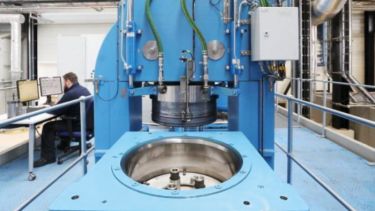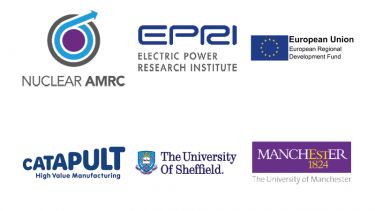Building Confidence in Powder Metallurgy
Components made from austenitic stainless steel powder can meet the material requirements of the civil nuclear industry, Nuclear AMRC researchers have shown.
The research, part of the Nuclear AMRC's ongoing collaboration with the US Electric Power Research Institute [EPRI], also demonstrated the robustness of the supply chain for powder metallurgy [PM] and hot isostatic pressing [HIP or HIP'ing].
The HIP'ing process produces near-net-shape components by pressing metal powder into the desired shape under very high pressures and temperatures. As well as reducing the need for machining and welding, hipping gives the components a very uniform structure and superior material properties.
The project focused on 316L, a low-carbon corrosion-resistant austenitic stainless steel which is widely used for nuclear pipework, valve bodies, and other components. HIP'ed 316L has been established in the oil and gas sector for 25 years, and has more recently been adopted for naval nuclear applications.
In the civil nuclear industry, HIP'ing could be a cost-effective method of producing complex piping joints and large valve bodies.
PM/HIP 316L has been accepted into the ASME code [code case N-834] following development work by EPRI, but the process has not yet been widely adopted by the nuclear supply chain.
"Part of the challenge is giving end-users and component manufacturers the confidence that PM/HIP is a viable alternative to current manufacturing processes.
What we wanted to do was provide the foundation for a guideline specification for the civil nuclear industry, based on the current state of the art of the supply chain."
Dr. Will Kyffin
Nuclear AMRC Technology Lead for Powder Metallurgy
The project analysed metal powder from three commercial providers. Each powder was used to produce a series of three billets by three HIP'ing service providers in Europe and the US.
Each consolidated the powder at 1160°C and 103MPa pressure for two, four, and eight hours to test the effects of prolonged processing. All 27 billets of processed 316L steel were then divided and analysed separately at the Nuclear AMRC and EPRI.
All showed consistent results, and met the material strength and toughness requirements considered essential for nuclear applications.
"That should give a high degree of confidence to prospective end-users of HIP'ed products, as it demonstrates the uniformity of the PM/HIP supply chain."
Dr. Will Kyffin
Nuclear AMRC Technology Lead for Powder Metallurgy
The analysis found no significant change in properties from longer processing times, with two hours ample to fully consolidate the sample billets.
This shows that the material response is relatively insensitive to the process parameters, so the process doesn't have to be precisely fine-tuned for different components.
EPRI is now preparing to publish the guideline specification of PM/HIP 316L material for civil nuclear applications, following review by key industry players, including reactor developers and the supply chain.
The Nuclear AMRC is collaborating with the US Electric Power Research Institute (EPRI) in a four-year project to develop new manufacturing and fabrication methods for reactor pressure vessels.
The project aims to reduce the total time needed to produce a SMR pressure vessel from around two and a half years to less than 12 months. In the first phase, they are developing electron beam welding techniques for vessel sections made from metal powder using hot isostatic pressing.
The project is funded by the US Department of Energy, and involves industrial partners on both sides of the Atlantic including Sheffield Forgemasters.



